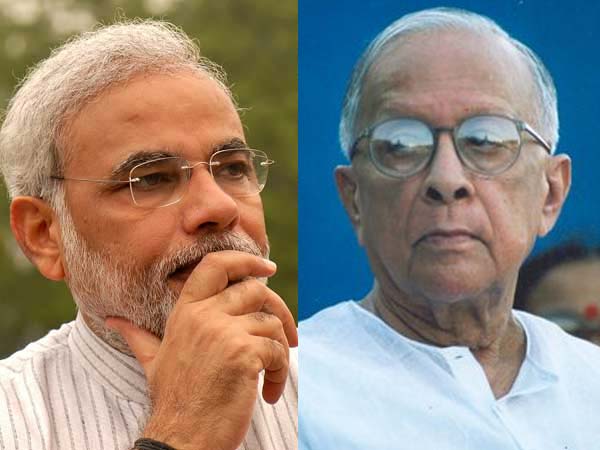
Not Jyoti Basu, Bengal needed a Narendra Modi to flourish
Narendra Modi has won his third electoral term and he will serve as the chief minister of Gujarat for 13 years at a stretch in case he becomes the Prime Minister in 2014. And if he doesn't, he will complete 16 years in the office of the Gujarat CM in 2017, when the state goes to the polls next time. The rise of Modi since 2001 has been a phenomenal one and various sections across the Gujarati society are happy with his leadership.
No matter what the 'liberal' media obsessed with 'communal marginalisation' says and whatever be the situation in Saurashtra-Kutch, there is no denying that Modi is the face of leadership of the new-age India. He is a leader highly revered and admired by the middle-class.

Narendra Modi vs Jyoti Basu
Modi's continuing at the helm and in the hearts of the middle-class inevitably brings him into comparison with another chief minister, who in fact holds the record as the longest-serving incumbent in the country. Jyoti Basu, the communist patriarch, is the late CM of West Bengal who died a few years ago at the age of 96.
According to one theory, Modi is a popular leader because the young Gujaratis have not seen any other regime and for them, a delivering chief minister is what they prefer. There is no alternative leader who can command an equal respect. The Congress has no face in the state while an elder leader like Keshubhai Patel has nothing to offer.
In 1977, the situation in Bengal was also somewhat similar. The oppressive regime of Siddhartha Shankar Ray had just been toppled and the state was struggling to come to terms with normalcy following a prolonged social disturbance. The communists formed the government of their own for the first time and people of a beleaguered state were hopeful about a new dawn. The credit for taming the Naxalite movement went to Basu and his party to a great extent.
The communists, in their initial years engaged in reforms in land and rural governance as their ideological bent was in favour of uplifting the poor and the downtrodden. This is precisely where the tale of Modi's Gujarat is strikingly different from Basu's Bengal. While Modi, a man who emerged from a humble background, banked on a strong urban electorate to rise to prominence, Basu, a man from a well-off family, mobilised the rural votebanks in a big way. The latter, although lived his own life king-size, never cared to improve the situation for the ordinary lot during his 23-year rule.
Basu never cared for urban development, Modi always did
The communist government was obsessed with the well-being of the rural sections' welfare and never bothered about the welfare of the urban classes. No industrialisation occurred despite Basu's several trips made abroad while English education and computer knowledge were deliberately discouraged. Politicisation of all classes across the society was the Leftists' alternative to the engineered destruction of the state's economy.
The educated middle-class fled the state for a better living elsewhere while upstarts began to fill up the vacuum created. Basu was an unsympathetic and unapologetic administrator and never cared for Bengal's development, just contrary to Modi, who means business. Even if it is autocratic in style, it serves the purpose.
Bhattacharjee tried to revive a state killed during Basu's regime
West Bengal turned into a wasteland in no time and when the state reached a desperate situation for an economic uplift, an old and fragile Basu had surrendered before the all-powerful party. The state understood what the rule of a party promoting an outdated ideology and it had paid dearly for that. Basu's successor Buddhadeb Bhattacharjee had no other option but force a pace of industrialisation for the state economy was going nowhere.
But his party, which clearly failed to cope with the changed realities, miscalculated the entire equation and after 34 years of largely unproductive rule, the Left was thrown out of power. But that did not mean Basu's legacy has come to an end. The current rulers resemble Basu's administration in some way and there is little chance that the negative legacy of man will be ever overcome.
Narendra Modi, on the other hand, just made a journey to the opposite direction. He also belongs to a cadre-based party, although it's more a national party in the true sense, but he never allowed elements to pull back his personal skills. The man has overcome the ghosts of 2002 riots through his gifted administrative skills and today is in a great position to go for the prime ministerial post. Basu, if it can be mentioned here, was not allowed to become the PM by his own party in 1996. However, having said that, one of Basu's appreciable efforts was his strict stance during the 1984 anti-Sikh riots and the communal tension during the Ayodhya agitation in 1992.
The contrasting story of Gujarat and Bengal shows that for a keen leadership, nothing is impossible. Basu, despite his 23-year stay in the CM's office, has not done anything noteworthy apart from allowing his son to get richer by leaps and bounds. His well-oiled party machinery and appeasement of Muslims allowed him to stay in power for there was no opposition to challenge him (Mamata was good as far as her own seat was concerned, her party was never in reckoning till 2011) and when the party was indeed kicked out from the government, the Left was in a shambles.
Narendra Modi has no such fear. His legacy will be treasured in Gujarat as long as the state is there and even if he fails to become the PM, Modi will always have his genuine followers to work for in Gujarat.
Basu will only be remembered for the numbers. Nothing more than that.


 Click it and Unblock the Notifications
Click it and Unblock the Notifications


































